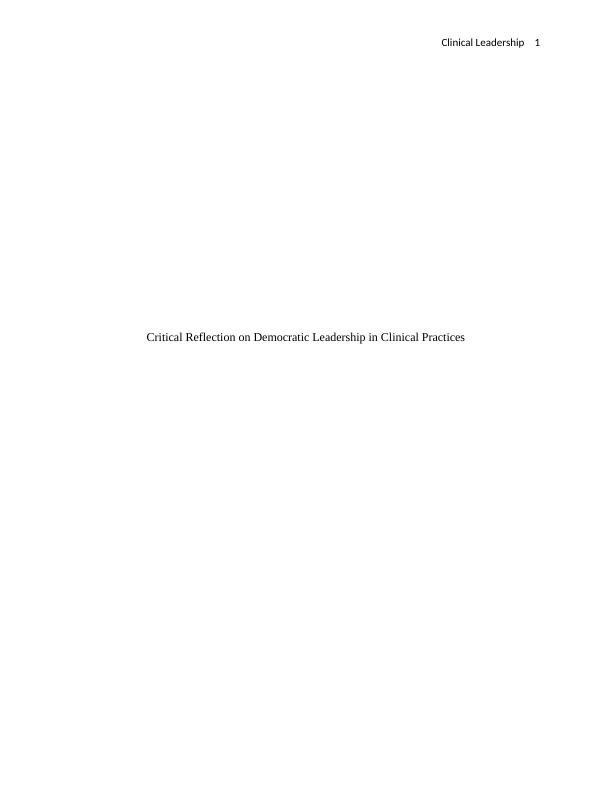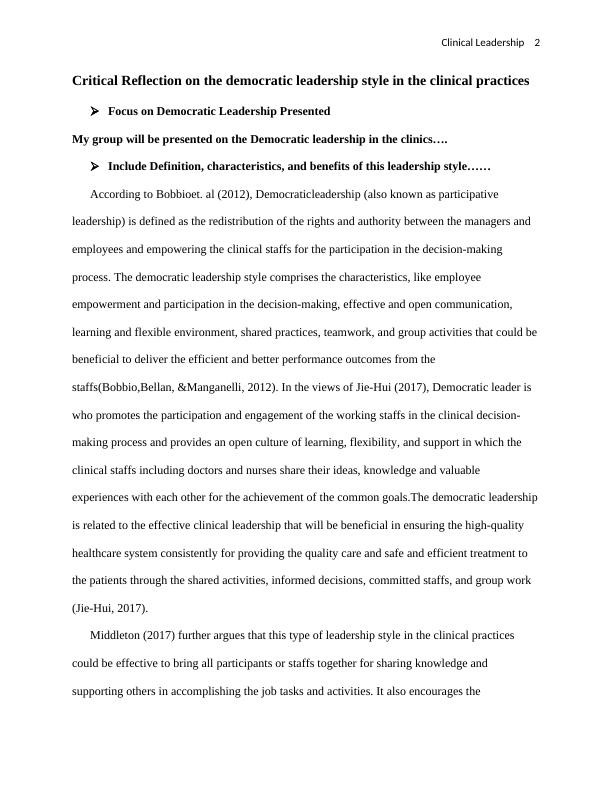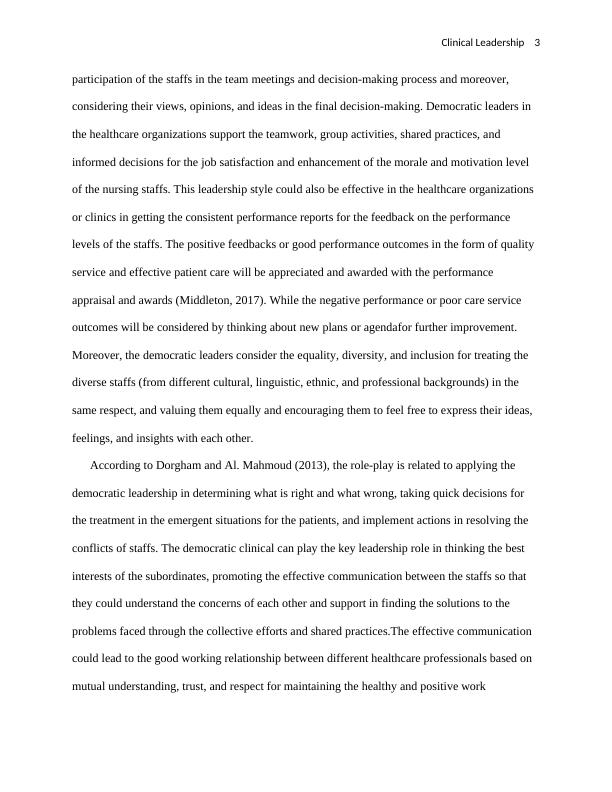Democratic Leadership in Clinical Practices
Added on 2023-06-03
6 Pages1366 Words88 Views
Clinical Leadership 1
Critical Reflection on Democratic Leadership in Clinical Practices
Critical Reflection on Democratic Leadership in Clinical Practices

Clinical Leadership 2
Critical Reflection on the democratic leadership style in the clinical practices
Focus on Democratic Leadership Presented
My group will be presented on the Democratic leadership in the clinics....
Include Definition, characteristics, and benefits of this leadership style......
According to Bobbioet. al (2012), Democraticleadership (also known as participative
leadership) is defined as the redistribution of the rights and authority between the managers and
employees and empowering the clinical staffs for the participation in the decision-making
process. The democratic leadership style comprises the characteristics, like employee
empowerment and participation in the decision-making, effective and open communication,
learning and flexible environment, shared practices, teamwork, and group activities that could be
beneficial to deliver the efficient and better performance outcomes from the
staffs(Bobbio,Bellan, &Manganelli, 2012). In the views of Jie-Hui (2017), Democratic leader is
who promotes the participation and engagement of the working staffs in the clinical decision-
making process and provides an open culture of learning, flexibility, and support in which the
clinical staffs including doctors and nurses share their ideas, knowledge and valuable
experiences with each other for the achievement of the common goals.The democratic leadership
is related to the effective clinical leadership that will be beneficial in ensuring the high-quality
healthcare system consistently for providing the quality care and safe and efficient treatment to
the patients through the shared activities, informed decisions, committed staffs, and group work
(Jie-Hui, 2017).
Middleton (2017) further argues that this type of leadership style in the clinical practices
could be effective to bring all participants or staffs together for sharing knowledge and
supporting others in accomplishing the job tasks and activities. It also encourages the
Critical Reflection on the democratic leadership style in the clinical practices
Focus on Democratic Leadership Presented
My group will be presented on the Democratic leadership in the clinics....
Include Definition, characteristics, and benefits of this leadership style......
According to Bobbioet. al (2012), Democraticleadership (also known as participative
leadership) is defined as the redistribution of the rights and authority between the managers and
employees and empowering the clinical staffs for the participation in the decision-making
process. The democratic leadership style comprises the characteristics, like employee
empowerment and participation in the decision-making, effective and open communication,
learning and flexible environment, shared practices, teamwork, and group activities that could be
beneficial to deliver the efficient and better performance outcomes from the
staffs(Bobbio,Bellan, &Manganelli, 2012). In the views of Jie-Hui (2017), Democratic leader is
who promotes the participation and engagement of the working staffs in the clinical decision-
making process and provides an open culture of learning, flexibility, and support in which the
clinical staffs including doctors and nurses share their ideas, knowledge and valuable
experiences with each other for the achievement of the common goals.The democratic leadership
is related to the effective clinical leadership that will be beneficial in ensuring the high-quality
healthcare system consistently for providing the quality care and safe and efficient treatment to
the patients through the shared activities, informed decisions, committed staffs, and group work
(Jie-Hui, 2017).
Middleton (2017) further argues that this type of leadership style in the clinical practices
could be effective to bring all participants or staffs together for sharing knowledge and
supporting others in accomplishing the job tasks and activities. It also encourages the

Clinical Leadership 3
participation of the staffs in the team meetings and decision-making process and moreover,
considering their views, opinions, and ideas in the final decision-making. Democratic leaders in
the healthcare organizations support the teamwork, group activities, shared practices, and
informed decisions for the job satisfaction and enhancement of the morale and motivation level
of the nursing staffs. This leadership style could also be effective in the healthcare organizations
or clinics in getting the consistent performance reports for the feedback on the performance
levels of the staffs. The positive feedbacks or good performance outcomes in the form of quality
service and effective patient care will be appreciated and awarded with the performance
appraisal and awards (Middleton, 2017). While the negative performance or poor care service
outcomes will be considered by thinking about new plans or agendafor further improvement.
Moreover, the democratic leaders consider the equality, diversity, and inclusion for treating the
diverse staffs (from different cultural, linguistic, ethnic, and professional backgrounds) in the
same respect, and valuing them equally and encouraging them to feel free to express their ideas,
feelings, and insights with each other.
According to Dorgham and Al. Mahmoud (2013), the role-play is related to applying the
democratic leadership in determining what is right and what wrong, taking quick decisions for
the treatment in the emergent situations for the patients, and implement actions in resolving the
conflicts of staffs. The democratic clinical can play the key leadership role in thinking the best
interests of the subordinates, promoting the effective communication between the staffs so that
they could understand the concerns of each other and support in finding the solutions to the
problems faced through the collective efforts and shared practices.The effective communication
could lead to the good working relationship between different healthcare professionals based on
mutual understanding, trust, and respect for maintaining the healthy and positive work
participation of the staffs in the team meetings and decision-making process and moreover,
considering their views, opinions, and ideas in the final decision-making. Democratic leaders in
the healthcare organizations support the teamwork, group activities, shared practices, and
informed decisions for the job satisfaction and enhancement of the morale and motivation level
of the nursing staffs. This leadership style could also be effective in the healthcare organizations
or clinics in getting the consistent performance reports for the feedback on the performance
levels of the staffs. The positive feedbacks or good performance outcomes in the form of quality
service and effective patient care will be appreciated and awarded with the performance
appraisal and awards (Middleton, 2017). While the negative performance or poor care service
outcomes will be considered by thinking about new plans or agendafor further improvement.
Moreover, the democratic leaders consider the equality, diversity, and inclusion for treating the
diverse staffs (from different cultural, linguistic, ethnic, and professional backgrounds) in the
same respect, and valuing them equally and encouraging them to feel free to express their ideas,
feelings, and insights with each other.
According to Dorgham and Al. Mahmoud (2013), the role-play is related to applying the
democratic leadership in determining what is right and what wrong, taking quick decisions for
the treatment in the emergent situations for the patients, and implement actions in resolving the
conflicts of staffs. The democratic clinical can play the key leadership role in thinking the best
interests of the subordinates, promoting the effective communication between the staffs so that
they could understand the concerns of each other and support in finding the solutions to the
problems faced through the collective efforts and shared practices.The effective communication
could lead to the good working relationship between different healthcare professionals based on
mutual understanding, trust, and respect for maintaining the healthy and positive work

End of preview
Want to access all the pages? Upload your documents or become a member.
Related Documents
Nursing Leadershiplg...
|5
|1153
|267
Health Care Sector And Reforms Analysis Reportlg...
|14
|4865
|15
Leadership Theory in Clinical Practicelg...
|8
|3756
|68
Leadership Styles for Nursing Professionalslg...
|11
|3090
|21
Democratic Leadership Stylelg...
|15
|887
|99
Different Leadership Styles in Nursing and Their Impact on Quality Carelg...
|8
|2532
|459